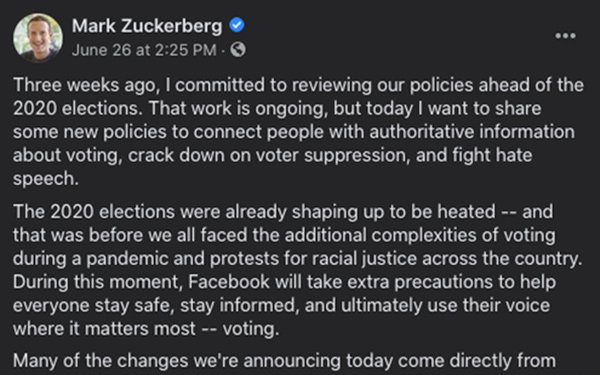
Amid what analysts are calling an unprecedented
ad boycott, Facebook has decided to modify its content policies.
Most notably, the social giant will soon begin labeling posts from influential figures that violate its standard content
policies.
“We’ll add a prompt to tell people that the content they’re sharing may violate our policies,” Facebook cofounder-CEO Mark Zuckerberg announced in a Friday post.
Of equal significance, Zuckerberg said Facebook will no
longer allow what he calls “newsworthiness exemptions” for posts from public figures that incite violence or suppress voting.
advertisement
advertisement
“Even if a politician or government official
says it, if we determine that content may lead to violence or deprive people of their right to vote, we will take that content down,” Zuckerberg declares.
Under these new terms,
President Trump most likely would not have been allowed to use his Facebook account to endorse the shooting of people looting businesses in response to the killing of George Floyd last month.
Initially, Zuckerberg responded to Trump’s threat by reiterating Facebook’s commitment to free expression.
Since then, however, a resulting civil-rights movement has swept the
country, while a growing number of critics inside and outside Facebook have called out the company’s refusal to impose stricter content standards on Trump.
At the beginning of the month,
hundreds of Facebook employees staged a “virtual walkout” for giving Trump a platform to incite violence and spread disinformation.
Since then, a growing number of advertisers have joined the
#StopHateForProfit campaign, which was launched by the NAACP, the Anti-Defamation League and other civil-rights groups.
As of Friday, the list of brand partners committed to boycotting Facebook properties
included Unilever, Verizon, Ben & Jerry’s, Eddie Bauer, Magnolia Pictures, Patagonia, The North Face, REI and Upwork.
Escalating the battle between Madison Avenue and the
social-media industry, Unilever said it was suspending all U.S. advertising on Facebook properties (and Twitter) for the rest of the year.
Additionally, Zuckerberg said Facebook would now prohibit a wider
category of hateful content in advertising.
“Specifically, we’re expanding our ads policy to prohibit claims that people from a specific race, ethnicity, national origin, religious
affiliation, caste, sexual orientation, gender identity or immigration status are a threat to the physical safety, health or survival of others,” he said.
The policy will also be
expanded to better protect immigrants, migrants, refugees and asylum seekers from ads suggesting these groups are “inferior” or expressing contempt, dismissal or disgust directed at them,
Zuckerberg added.
Telegraphing this change, Facebook recently took down a number of ads bought by Trump’s reelection campaign, which featured Nazi symbols.